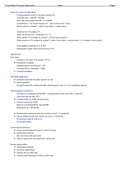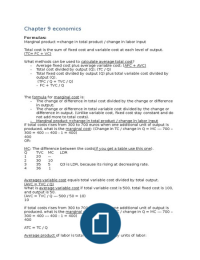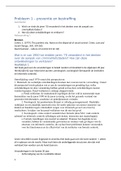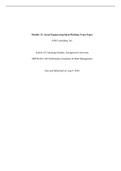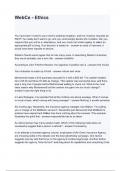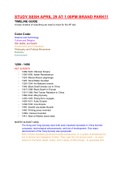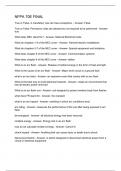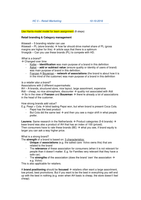INTERVIEW PREPARATION NOTES
Motivation and Work Experience
What are these questions about?
o Why medicine?
o Knowledge about medicine
i.e., skills and qualities; roles of doctors (clinical vs non-clinical, so
teaching/research/extra learning vs treatment planning, making a diagnosis, MDT
meetings); challenges
Work Experience Reflections
Onion layer technique
1. Give context to the scenario.
Always have a back story e.g. why is teamwork important – witnessing doctors
collaborate to conduct MDT meetings when assessing and reviewing the care of
the patients they delivered
2. What did the doctor do?
e.g. The way I saw the doctors working in the team when discussing each patient
case and when I saw that each took in turn discussing their own expertise and
advice on each patient case – all other healthcare professionals were listening
intently and were respecting each others opinions. By the end they agreed on
what is the best step to take forward, taking parts of everyone’s expertise and
putting it together
Skills behind the skills e.g. breaking down into other skills such as respecting each
other, listening skills, communication skills
3. How was patient care affected?
After MDT meeting, each sub team knew their roles and responsibilities in
further managing each patient’s care – entire team was aligned on a plan of
action to move forward and give each patient the most tailored possible care that
they need
If meeting didn’t occur updates wouldn’t be given on patients’ health, everyone
would be out of the loop e.g. nursing team wouldn’t know new assignations
doctors had given them, consultants would be out of the loop with the doctors –
creates a powerful realignment - everyone working on same page – same team
and same plan
Give an actual patient case example e.g. patient with a disability – saw doctors
talk about patient care plan, nurses decide what regular care the patient needs –
how often they need to be washed, bedding change, vitals monitored –
occupational therapist came in, adjustment of home to be moving around better.
If language impairment, speech and language therapist came in for their opinion
on therapy. HOLLISTIC CARE!
4. Summarise what you’ve learnt.
Reflection, how has scenario changed your perspective
“after seeing all that, it left me with a very powerful learning point” treating
patients is never a one man job, it requires a team effort. So important to track
, everything done as there are new doctors and teams – note-taking is very
important so other healthcare professionals can pick up and carry on with that
patient’s treatment process. Main thing learnt is you need to be in the loop with
each other – open communication is what allows hospitals to stay open and
patient care to keep moving forward
Example reflection:
- On a virtual work experience, I saw multiple GP consultations where each had a patient
of a different demographic
- The GP adeptly changed her paralanguage and non-verbal communication between
patients depending on who they were – more light-hearted tone with children and a
patient, slower approach with more emphasis on body language for an older adult who
was hard of hearing.
- This helped build rapport with the patients more easily and allowed the GP and patients
to communicate with each other effectively to engage in shared decision making to
design the best care plan.
- I’ve leant the importance of subtle communication changes in providing tailored,
patient-centred care.
Homework – write as many full reflections in a table
Personal Qualities
- The importance of volunteering; care home, mentoring – positive impact on people –
shows you’re a selfless person – empathy skills, compassionate
- The importance of extracurriculars
- Tell a story.
- Have passion.
- E.g., working at Gregg’s was lifechanging
1. Describe the role or experience you had.
2. What skills did you develop/qualities did you show/
3. How did you develop them?
4. How is that skill important in medicine?
e.g. The role I had was I tutored children in year 7 and 8, and even 11 plus students. I’ve
been doing this for a few years in my spare time. The main skill I developed was teaching – I
have learnt what it means to be a teacher. Teaching is about most for student tailor to them
– good listener break concepts into smaller slow empathetic mindful regularly check in
everything centred around them. Overtime I learnt importance because at beginning I
wasn’t sure what I was doing not sure how to be best consider them what they found
difficult empowering them reassure them built a relationship great environment for both is.
In medicine teaching is important as a lot of the time in medicine patients may come in with
concerns and misconceptions – assess what they know and break down any myths –
children also have a lot of anxiety patient is more likely to agree.
, Ethics
EMPATHY
- Be a detective.
- Make the right decision.
- Dealing with the aftermath
ETHICAL PILLARS
Beneficence (best interest of all patients)
Non-maleficence (don’t harm patient in any way, shape or form)
Autonomy (patients get the final say)
Justice (treat all patients equally and with respect)
Structure is crucial. Signpost – ask the question out loud and then answer it.
e.g., can I decide straight away? No …… What must my decision be based on? What factors
am I considering? What would I do after I have made the decision? How do I tell patient 1
and patient 2? (Breaking up answer into smaller paragraphs)
Case 1
You are a lead consultant in the gastro department of a hospital. A patient has recently
passed away, leaving behind a healthy liver suitable for donation. You have 2 candidates
that require a liver transplant. A 33-year-old mother and a 13-year-old boy. You must
decide who receives the liver.
Can you jump into a decision straight away?
No! we haven’t been given a lot of information and this is a very complex case.
What must your decision be based on?
- The Equality Act 2010
- Must not be based on race, ethnicity, religion, age, nationality, lifestyle, sexuality, gender
- Based on CLINICAL vs NON-CLINICAL FACTORS
- Clinical:
COMPATIBILITY – does liver work, any issues with blood type? The donor and the
receiver must have matching antigens on the surface of their organs. If this isn’t
the case, the organ will be broken down by the body’s immune system. Also
consider the impact of immunosuppression.
LIFESTYLE – e.g., still drinking, will it go to waste? If organ damage due to
drugs/alcohol, the patient will damage the donor organ
AGE: 99-year-old vs 13 year old – the greater good, how long will it be used. Age
can play a part in the survival chances of a procedure. Older people may struggle
with recovery, and they are more vulnerable to post-surgical infection.
QALYSs – Quality Adjusted Life Years. 1 QALY is living one year of life in perfect
health. 0.5 QALY if living a year with half of perfect health. A way of measuring
who will have more QALY – a metric you can consider using.
Motivation and Work Experience
What are these questions about?
o Why medicine?
o Knowledge about medicine
i.e., skills and qualities; roles of doctors (clinical vs non-clinical, so
teaching/research/extra learning vs treatment planning, making a diagnosis, MDT
meetings); challenges
Work Experience Reflections
Onion layer technique
1. Give context to the scenario.
Always have a back story e.g. why is teamwork important – witnessing doctors
collaborate to conduct MDT meetings when assessing and reviewing the care of
the patients they delivered
2. What did the doctor do?
e.g. The way I saw the doctors working in the team when discussing each patient
case and when I saw that each took in turn discussing their own expertise and
advice on each patient case – all other healthcare professionals were listening
intently and were respecting each others opinions. By the end they agreed on
what is the best step to take forward, taking parts of everyone’s expertise and
putting it together
Skills behind the skills e.g. breaking down into other skills such as respecting each
other, listening skills, communication skills
3. How was patient care affected?
After MDT meeting, each sub team knew their roles and responsibilities in
further managing each patient’s care – entire team was aligned on a plan of
action to move forward and give each patient the most tailored possible care that
they need
If meeting didn’t occur updates wouldn’t be given on patients’ health, everyone
would be out of the loop e.g. nursing team wouldn’t know new assignations
doctors had given them, consultants would be out of the loop with the doctors –
creates a powerful realignment - everyone working on same page – same team
and same plan
Give an actual patient case example e.g. patient with a disability – saw doctors
talk about patient care plan, nurses decide what regular care the patient needs –
how often they need to be washed, bedding change, vitals monitored –
occupational therapist came in, adjustment of home to be moving around better.
If language impairment, speech and language therapist came in for their opinion
on therapy. HOLLISTIC CARE!
4. Summarise what you’ve learnt.
Reflection, how has scenario changed your perspective
“after seeing all that, it left me with a very powerful learning point” treating
patients is never a one man job, it requires a team effort. So important to track
, everything done as there are new doctors and teams – note-taking is very
important so other healthcare professionals can pick up and carry on with that
patient’s treatment process. Main thing learnt is you need to be in the loop with
each other – open communication is what allows hospitals to stay open and
patient care to keep moving forward
Example reflection:
- On a virtual work experience, I saw multiple GP consultations where each had a patient
of a different demographic
- The GP adeptly changed her paralanguage and non-verbal communication between
patients depending on who they were – more light-hearted tone with children and a
patient, slower approach with more emphasis on body language for an older adult who
was hard of hearing.
- This helped build rapport with the patients more easily and allowed the GP and patients
to communicate with each other effectively to engage in shared decision making to
design the best care plan.
- I’ve leant the importance of subtle communication changes in providing tailored,
patient-centred care.
Homework – write as many full reflections in a table
Personal Qualities
- The importance of volunteering; care home, mentoring – positive impact on people –
shows you’re a selfless person – empathy skills, compassionate
- The importance of extracurriculars
- Tell a story.
- Have passion.
- E.g., working at Gregg’s was lifechanging
1. Describe the role or experience you had.
2. What skills did you develop/qualities did you show/
3. How did you develop them?
4. How is that skill important in medicine?
e.g. The role I had was I tutored children in year 7 and 8, and even 11 plus students. I’ve
been doing this for a few years in my spare time. The main skill I developed was teaching – I
have learnt what it means to be a teacher. Teaching is about most for student tailor to them
– good listener break concepts into smaller slow empathetic mindful regularly check in
everything centred around them. Overtime I learnt importance because at beginning I
wasn’t sure what I was doing not sure how to be best consider them what they found
difficult empowering them reassure them built a relationship great environment for both is.
In medicine teaching is important as a lot of the time in medicine patients may come in with
concerns and misconceptions – assess what they know and break down any myths –
children also have a lot of anxiety patient is more likely to agree.
, Ethics
EMPATHY
- Be a detective.
- Make the right decision.
- Dealing with the aftermath
ETHICAL PILLARS
Beneficence (best interest of all patients)
Non-maleficence (don’t harm patient in any way, shape or form)
Autonomy (patients get the final say)
Justice (treat all patients equally and with respect)
Structure is crucial. Signpost – ask the question out loud and then answer it.
e.g., can I decide straight away? No …… What must my decision be based on? What factors
am I considering? What would I do after I have made the decision? How do I tell patient 1
and patient 2? (Breaking up answer into smaller paragraphs)
Case 1
You are a lead consultant in the gastro department of a hospital. A patient has recently
passed away, leaving behind a healthy liver suitable for donation. You have 2 candidates
that require a liver transplant. A 33-year-old mother and a 13-year-old boy. You must
decide who receives the liver.
Can you jump into a decision straight away?
No! we haven’t been given a lot of information and this is a very complex case.
What must your decision be based on?
- The Equality Act 2010
- Must not be based on race, ethnicity, religion, age, nationality, lifestyle, sexuality, gender
- Based on CLINICAL vs NON-CLINICAL FACTORS
- Clinical:
COMPATIBILITY – does liver work, any issues with blood type? The donor and the
receiver must have matching antigens on the surface of their organs. If this isn’t
the case, the organ will be broken down by the body’s immune system. Also
consider the impact of immunosuppression.
LIFESTYLE – e.g., still drinking, will it go to waste? If organ damage due to
drugs/alcohol, the patient will damage the donor organ
AGE: 99-year-old vs 13 year old – the greater good, how long will it be used. Age
can play a part in the survival chances of a procedure. Older people may struggle
with recovery, and they are more vulnerable to post-surgical infection.
QALYSs – Quality Adjusted Life Years. 1 QALY is living one year of life in perfect
health. 0.5 QALY if living a year with half of perfect health. A way of measuring
who will have more QALY – a metric you can consider using.

